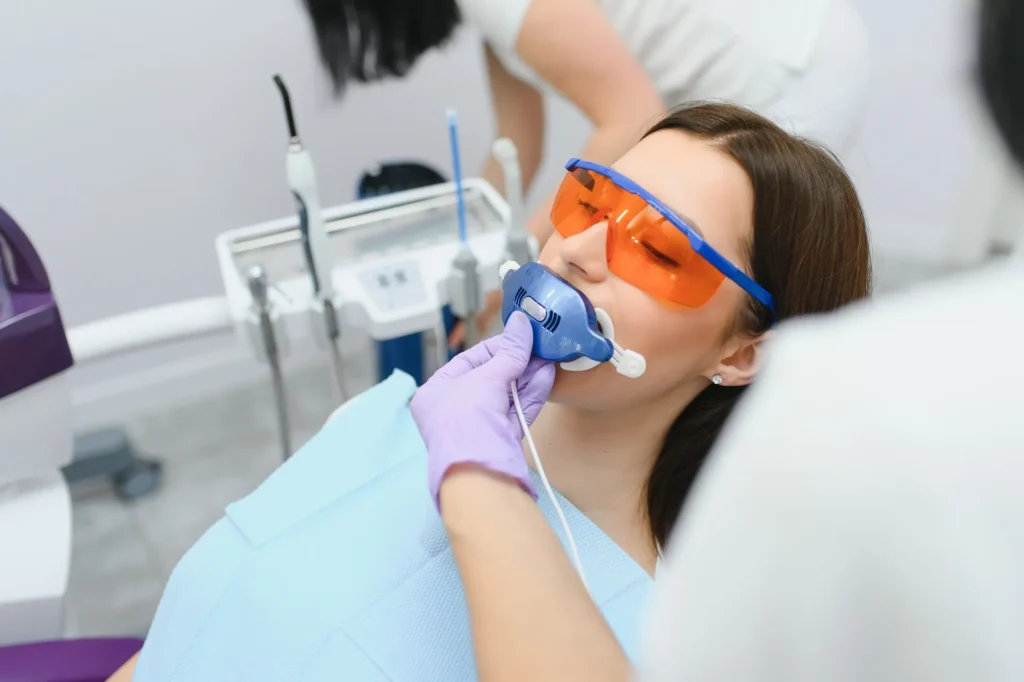After undergoing a Tooth Whitening treatment, many individuals wonder about the best practices to maintain their newly achieved white smile. This guide will provide essential information about the teeth whitening process, including the ideal waiting period before you can eat normally, and the types of foods to avoid for optimal whitening results.
What Should You Know About the Tooth Whitening Process?
The tooth whitening process involves various techniques designed to lighten the color of your teeth, enhancing your smile’s brightness. Understanding how the whitening procedure works is crucial for maintaining your results.
Whether opting for in-office tooth whitening or at-home treatments, the goal is to achieve a whiter shade without compromising dental health.
How Does the Whitening Procedure Affect Your Teeth?
The whitening procedure can temporarily alter the structure of your teeth, making them more susceptible to staining; therefore, it’s essential to watch what you eat during this time.
During the treatment, the pores of your teeth open to absorb the whitening agents, which can leave them vulnerable for a period, so you should avoid any foods or drinks that could stain. It’s essential to recognize that while this process can yield remarkable results, it also requires careful aftercare to keep your teeth stain-free.
What Changes Occur in the Pores of Your Teeth?
As the whitening agents penetrate the enamel, they reach the underlying pores of your teeth, removing stains and discoloration. This process creates a more porous surface, which can absorb pigments from foods and drinks more readily.
Consequently, after a teeth whitening treatment, your teeth may be more prone to staining until the pores close again, making it vital to be cautious with your diet.
How Does Professional Teeth Whitening Differ from At-Home Treatments?
Professional teeth whitening typically uses stronger agents compared to at-home whitening kits, resulting in faster and more noticeable whitening results. Dental professionals can customize the treatment to suit your specific needs, ensuring both effectiveness and safety.
However, regardless of the method chosen, it’s crucial to follow post-treatment guidelines to maintain the results and protect your teeth from potential stains.
When Can You Eat Normally After a Teeth Whitening Treatment?

Knowing when you can eat normally after teeth whitening is essential to prolonging the effects of the treatment. Most professionals recommend waiting at least 48 hours before consuming certain foods and drinks; this waiting period is crucial for optimal results from getting your teeth whitened.
This waiting period allows your teeth to rehydrate and the pores to close, minimizing the risk of staining and ensuring your teeth remain white and radiant; be sure to watch what you eat during this time.
What Is the Recommended Waiting Period Hours After Teeth Whitening?
It’s generally advised to wait a minimum of 48 hours after teeth whitening before returning to your regular eating habits to avoid any foods or drinks that could stain your teeth. This duration is critical, as it allows your teeth to stabilize after the whitening process.
Eating immediately after teeth whitening can compromise the results, so patience is key during this period; it’s recommended to avoid eating and drinking for at least 48 hours.
Why Is It Crucial to Avoid Certain Foods Initially?
After a whitening treatment, it’s essential to avoid consuming highly pigmented foods and drinks, as they can stain your teeth and lead to undesired results from your teeth bleaching services.
Foods such as red wine, coffee, and dark berries should be off-limits during the initial days. By steering clear of these staining foods, you can better maintain the bright results of your teeth whitening procedure.
How Does Eating Immediately After Teeth Whitening Impact Results?
Eating immediately after teeth whitening can severely impact your whitening results; it’s recommended to avoid acidic foods and drinks for a while. When you eat, the pigments from the food can quickly seep into the open pores of your teeth, leading to discoloration; this is why it’s crucial to watch what you eat after treatment.
To protect your investment in whitening, it’s best to avoid food and beverages for at least a couple of hours after your treatment, allowing your teeth to recover.
What Foods to Avoid After Teeth Whitening?
Which Staining Foods Should Be Avoided?
After undergoing a teeth whitening treatment, it’s essential to avoid highly pigmented foods that can stain your teeth, ensuring the best results from your in-office tooth whitening services. Foods such as dark berries, red sauces, and beverages like red wine and coffee should be strictly off-limits for at least 48 hours; consuming these can stain a white shirt as easily as they can stain your teeth. For more tips on maintaining your bright smile and expert advice on post-whitening care, Personalized Blog is an excellent resource to explore.
These staining foods can quickly seep into the open pores of your teeth, diminishing the whitening results. By carefully selecting what you eat during this critical period, you can help ensure that your white smile remains pristine and vibrant.
How Do Acidic Foods Affect Your White Smile?
Acidic foods can pose a significant threat to your newly whitened teeth. Foods such as citrus fruits, vinegar, and sodas can erode enamel, making your teeth more susceptible to staining. When the enamel is compromised, the underlying dentin may become more visible, leading to a dull appearance.
To maintain the brightness achieved from your whitening procedure, it’s crucial to avoid consuming these acidic foods right after treatment. Protecting your teeth from such harmful substances will help prolong your whitening results.
What Food and Beverages Are Considered High-Risk?
In addition to acidic and highly pigmented foods, certain beverages are considered high-risk immediately after teeth whitening. Beverages like cola, tea, and even some fruit juices can stain your teeth due to their pigmentation and acidity.
It’s best to stick to water and clear liquids during the first 48 hours post-whitening. By being mindful of your diet after teeth whitening, you can significantly improve the longevity of your results and keep your smile looking its best.
What Are the Best Foods to Eat After Whitening?

Why Are Foods to Eat After Teeth Whitening Crucial?
Choosing the right foods to eat after teeth whitening is crucial for maintaining the integrity of your results. Consuming non-staining and soft foods can help protect your teeth while they are still vulnerable.
Foods such as yogurt, mashed potatoes, and soft cheeses are excellent choices as they are less likely to stain and are gentle on the teeth. A careful selection of foods can support your dental health and prolong the effects of your whitening treatment.
How Can You Maintain the Whitening Results with Diet?
To maintain your whitening results, it’s essential to adopt a diet that minimizes exposure to staining agents. Incorporating whitening-friendly foods like crunchy vegetables, apples, and dairy products can help keep your teeth cleaner and brighter.
These foods not only contribute to a healthier diet but also aid in the natural cleaning process of your teeth, helping to preserve that dazzling white smile you’ve worked hard to achieve.
What Are Some Whitening-Friendly Foods?
Whitening-friendly foods are typically those that are less likely to stain or damage your teeth, contributing to post-teeth whitening success. These include foods like bananas, chicken, and fish, which are not only easy on the enamel but also nutritious.
Additionally, consuming plenty of water can help rinse away any food particles and prevent staining. By prioritizing these foods in your diet after teeth whitening, you can effectively support the longevity of your beautiful smile.
How to Maintain the Results of Your Professional Teeth Whitening?
How Often Should You Brush Your Teeth?
Brushing your teeth regularly is a vital component of maintaining your whitening results. It’s recommended to brush at least twice a day, using a soft-bristled toothbrush and a non-abrasive whitening toothpaste.
This routine helps remove plaque buildup and prevents stains from settling in. By keeping a consistent brushing schedule, you can protect your teeth from discoloration and enjoy the benefits of your professional teeth whitening treatment for longer.
Which Habits Help Keep Your Teeth Whitening Results?
In addition to brushing, adopting certain habits can significantly enhance your whitening results. Avoiding tobacco products is crucial, as they are notorious for yellowing teeth.
Regular dental check-ups and cleanings can also help maintain your results, as dental professionals can address any potential issues before they become problematic. Being mindful of your oral hygiene habits will ensure that your teeth remain bright and healthy after whitening.
What Are Tips for Long-Term Whitening Aftercare?
For long-term whitening aftercare, it’s essential to stay diligent with your oral hygiene practices. Drinking plenty of water can help wash away food residues and prevent staining, while using a straw for beverages can minimize contact with your teeth after teeth bleaching.
Additionally, consider using touch-up whitening products as recommended by your dentist for post-teeth whitening care. Following these tips will help you maintain your white smile and enjoy the confidence that comes with it.








No Comment! Be the first one.